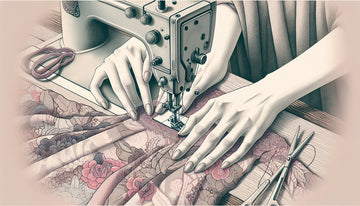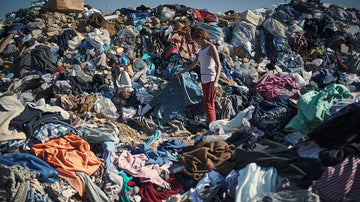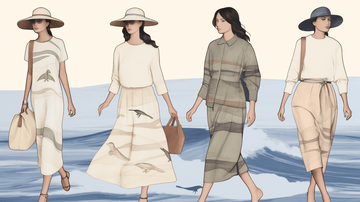Can Fashion be Considered Fair Trade? Why We Should Shop Fair Trade
by Lana Sands on Feb 19, 2024

Yes, fashion can be considered fair trade when it adheres to the principles of fair trade practices. Fair trade in the fashion industry aims to promote social and economic equity for workers, artisans, and farmers involved in the production of clothing and textiles. It focuses on ensuring fair wages, safe working conditions, and sustainable practices throughout the supply chain.
When making Sands Swim, we knew we wanted our swim produced in the USA. We also knew that we wanted an eco-friendly fabric that was quality and felt good on your skin. We also toured our production site in Los Angeles, California. We met with the owners of the small production house we had inquired with. We met with their employees and we saw first hand the clean and safe work environment. We also asked what their pay wages were and they were above minimum wage and included benefit options.
Although this cost us far more to produce Sands Swim in the United States than if we had chosen to have it produced somewhere else, we were committed to our ethics and sustainability mission. The price tag may be higher than other swim brands but it also represents the fair wages paid, the many jobs it helped sustain and create in the United States, and the eco-friendly quality recycled Italian fabric chosen. So you can feel good knowing what you are paying for. We sure do!
Key features of fair trade fashion include:
Fair Wages: Workers in fair trade fashion are paid fair wages that meet or exceed local and international standards. This ensures that laborers receive compensation that allows them to meet their basic needs and provides a decent standard of living.
Safe Working Conditions: Fair trade fashion prioritizes safe and healthy working conditions for workers. This includes adherence to safety regulations, proper ventilation, and measures to prevent workplace hazards.
No Child Labor: Fair trade principles prohibit the use of child labor. Companies involved in fair trade fashion ensure that workers are of legal working age and have access to education and proper living conditions.
Gender Equality: Fair trade fashion promotes gender equality by ensuring that both male and female workers receive equal pay for equal work. It also addresses issues related to discrimination and harassment.
Environmental Sustainability: Many fair trade fashion brands also focus on environmental sustainability. This includes using eco-friendly materials, reducing water and energy consumption, and minimizing the environmental impact of production processes.
Community Development: Fair trade fashion contributes to community development by reinvesting a portion of profits into local projects and initiatives. This can include education programs, healthcare services, and infrastructure development.
Transparent Supply Chain: Fair trade fashion brands are often transparent about their supply chain, providing information about the origin of materials, production processes, and the working conditions of those involved in manufacturing.
To identify fair trade fashion, consumers can look for certification labels such as Fair Trade Certified, which ensures that the product has met specific social, economic, and environmental standards. Additionally, some fair trade fashion brands may have their own transparent policies and ethical practices.
By choosing fair trade fashion, consumers can support ethical and sustainable practices in the fashion industry, contributing to positive social impact and environmental responsibility. It empowers consumers to make informed choices that align with their values and promote a fairer and more sustainable fashion landscape. It also feels good as a small business owner to support another small business owner and be directly involved in creating and/or sustaining jobs in the United States where we live.


